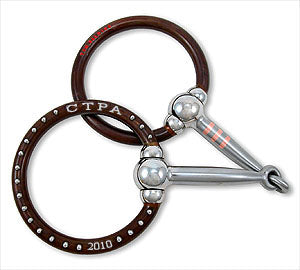Understanding the importance of materials in the mouthpiece of your bits is a huge key to how successful you will be at getting the most out of your horse's performance. There are many options for bits and not all horses like the same mouthpiece. Granted, sometimes it is not the bit but whose hands the bit is in that can ultimately determine if the horse is responsive or accepting. A good sign that a horse has accepted its bit is the way he carries his head. A horse that is soft or accepting of the bit is flexing at the poll, relaxed at the jaw, and not mouthing the bit.
Some common behaviors for not accepting the bit include head-tossing, chewing, or gaping mouth. If one sees their horse displaying such behavior, it is always a good idea to have your horse’s teeth checked as well as checking to see if there are sharp edges or pinching. Another major sign to look for is if the horse is producing saliva. Increased saliva production will increase sensitivity and allow the bit to properly roll and rotate in the horse’s mouth. Various metals used to make mouthpieces, such as steel (sometimes referred to as sweet iron) and copper, will help increase saliva production in your horse’s mouth.
The ideal mouthpiece is made with a combination of both. Sometimes you will see small strips of inlaid copper or a roller. What material is in your horses’ mouth? A shiny, silver-colored mouthpiece is more than likely to be stainless steel. Mass produced bit manufactures commonly use stainless steel for their bit mouthpieces. It lacks flavor, so it can dry out a horses’ mouth.
A sweet iron with copper mouthpiece generally will turn brown in color over time, which is a positive thing. Most horsemen prefer a sweet iron or copper mouthpiece as horses find these most palatable. When selecting a bit, visiting with a professional is always good advice. Be sure the material is smooth without sharp edges, non-pinching, well balanced, and built for strength.
A happy horse starts with what’s in its mouth! Things to consider when you go shopping for your next bit: Sweet iron and copper are generally best for mouthpieces, Stainless where there are moving parts helps extend the life of the Bit, Overall strength, especially moving parts, Non-pinching, Well balanced and symmetrical, smooth, without sharp edges, Quality of material, Invest in quality; it will last a lifetime

1 comment
Thank you this is very helpful. If rust forms on Your bit, should you try to get it off? Does it matter for the horse?